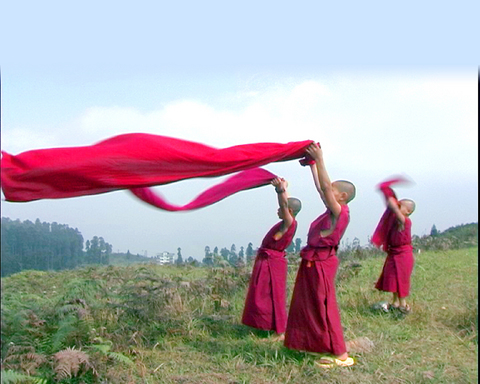Film-lovers who enjoy experiencing different lives in faraway places without leaving home will have a ball this weekend at the 2005 Taiwan International Ethnographic Film Festival (TIEFF). Founded in 2001, TIEFF is a biennial event that aims to broaden perceptions and encourage communication between ethnic groups and cultures through the medium of ethnographic cinema. Gaining international recognition from the past two events, the festival received more than 250 entries from around the world, and the best 37 films were selected for local audiences.
Choosing the theme of family variations for this year's programs, festival curator Lin Wen-ling (林文玲) said the aim is to present cultural differences and diversity from cross-cultural perspectives on families from various regions.
As a basic social unit, the family is not only closely related to kinship and marital systems, gender roles and customs, but also heavily influenced by social, economic, political and cultural conditions of society. Lin believes that an insightful understanding on the social construction of families can be gained from examining family relationships.

Among the line-up, US director Murray Nossel looks at the issues of gay parenting and surrogate motherhood through the portrait of a new type of American family in his Paternal Instinct. Bride Kidnapping in Kyrgyzstan tells of the story of the abduction of women in the Central Asian country. In Children by Remote Control, director Nahum Landau makes a provoking commentary on the globalization of labor through his knowledge of Thai workers who are torn between heavy economic pressure and their bonds with relatives back home. The Perfect Dream is a film-about-a-film conceived by a group of young refugees from the Third World living in Germany. In the film, they portray mafia members, but in real life, the young actors have to face hardship and misunderstanding in a foreign land.
This year's "Director Spotlight" will introduce two distinguished Australian directors, David and Judith MacDougall, and the late American master John Marshall. The MacDougalls are veteran filmmakers and scholars who have significantly influenced the theory and practice of ethnographic cinema. Two parts of the MacDougalls' renowned Turkana Trilogy, made in the 1980s, will be screened at the festival. Lorang's Way and A Wife Among Wives both examine the society of the semi-nomadic herders of northwestern Kenya and their polygamous marital structure.
In the program dedicated to John Marshall, as a leading figure in ethnographic cinema, the festival will present the first two films of his five-part series of A Kalahari Family that documents 50 years of the lives of tribespeople in South Africa's Karahari Desert. Marshall began his remarkable interaction with the tribe during his first trip to Africa in 1951 and followed closely the changing lives of the tribe members and also got deeply involved in the tribe's fight for the survival of their culture until the series was completed in 2002.

PHOTO COURTESY OF TIEFF
Apart from the family variations series three programs grouped under the theme of new vision will introduce works that examine various issues affecting human rights and indigenous cultures. Indigenous Perspectives presents award-winning films from Australia, Canada, China and Taiwan that document cultural conflicts and the political and social oppression faced by native tribes. The :"Human Rights and Autonomy" section includes What Remains of Us from Canada, a brave documentary about a young director who carried video messages recorded by the former spiritual and political leader of Tibet, the Dalai Lama, into the "largest prison in the world" and shot the film without the knowledge of Chinese authorities. Before the screening, the festival staff will ask the audience to leave all recording equipment outside the theater for the protection and safety of the people featured in the film.
Due to the tight budgets faced by most fringe festivals in Taiwan, the festival will show one screening per day for each film in its five-days. The organizer has invited more than half of the participating foreign directors to Taipei for an international exchange on ethnographic cinema and to hold question and answer sessions after each screening. For more information about the films and screening schedule visit TIEFF's bilingual official Web site at http://www.tieff.sinica.edu.tw.

PHOTO COURTESY OF TIEFF

That US assistance was a model for Taiwan’s spectacular development success was early recognized by policymakers and analysts. In a report to the US Congress for the fiscal year 1962, former President John F. Kennedy noted Taiwan’s “rapid economic growth,” was “producing a substantial net gain in living.” Kennedy had a stake in Taiwan’s achievements and the US’ official development assistance (ODA) in general: In September 1961, his entreaty to make the 1960s a “decade of development,” and an accompanying proposal for dedicated legislation to this end, had been formalized by congressional passage of the Foreign Assistance Act. Two

March 31 to April 6 On May 13, 1950, National Taiwan University Hospital otolaryngologist Su You-peng (蘇友鵬) was summoned to the director’s office. He thought someone had complained about him practicing the violin at night, but when he entered the room, he knew something was terribly wrong. He saw several burly men who appeared to be government secret agents, and three other resident doctors: internist Hsu Chiang (許強), dermatologist Hu Pao-chen (胡寶珍) and ophthalmologist Hu Hsin-lin (胡鑫麟). They were handcuffed, herded onto two jeeps and taken to the Secrecy Bureau (保密局) for questioning. Su was still in his doctor’s robes at

Last week the Democratic Progressive Party (DPP) said that the budget cuts voted for by the China-aligned parties in the legislature, are intended to force the DPP to hike electricity rates. The public would then blame it for the rate hike. It’s fairly clear that the first part of that is correct. Slashing the budget of state-run Taiwan Power Co (Taipower, 台電) is a move intended to cause discontent with the DPP when electricity rates go up. Taipower’s debt, NT$422.9 billion (US$12.78 billion), is one of the numerous permanent crises created by the nation’s construction-industrial state and the developmentalist mentality it

Experts say that the devastating earthquake in Myanmar on Friday was likely the strongest to hit the country in decades, with disaster modeling suggesting thousands could be dead. Automatic assessments from the US Geological Survey (USGS) said the shallow 7.7-magnitude quake northwest of the central Myanmar city of Sagaing triggered a red alert for shaking-related fatalities and economic losses. “High casualties and extensive damage are probable and the disaster is likely widespread,” it said, locating the epicentre near the central Myanmar city of Mandalay, home to more than a million people. Myanmar’s ruling junta said on Saturday morning that the number killed had